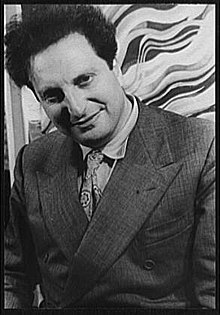Carlo Levi | |
|---|---|
 Carlo Levi in 1947 (portrait by Carl Van Vechten) | |
| Born | 29 November 1902 Turin, Italy |
| Died | 4 January 1975 (aged 72) Rome, Italy |
| Education | Self taught, University of Turin (MD) |
| Known for | Painting, Literature, Medicine |
| Notable work | Cristo si è fermato ad Eboli (Christ Stopped at Eboli) (1945) |
| Movement | Contemporary |
| Awards | Senator of the Italian Republic |
| Patron(s) | Felice Casorati |
Carlo Levi (Italian pronunciation: [ˈkarlo ˈlɛːvi]) (29 November 1902 – 4 January 1975) was an Italian painter, writer, activist, independent leftist politician, and doctor.
He is best known for his book Cristo si è fermato a Eboli (Christ Stopped at Eboli), published in 1945, a memoir of his time spent in exile in Lucania, Italy, after being arrested in connection with his political activism. In 1979, the book became the basis of a movie of the same name, directed by Francesco Rosi. Lucania, also called Basilicata, was historically one of the poorest regions of the impoverished Italian south. Levi's lucid, non-ideological and sympathetic description of the daily hardships experienced by the local peasants helped to propel the "Problem of the South" into national discourse after the end of World War II.